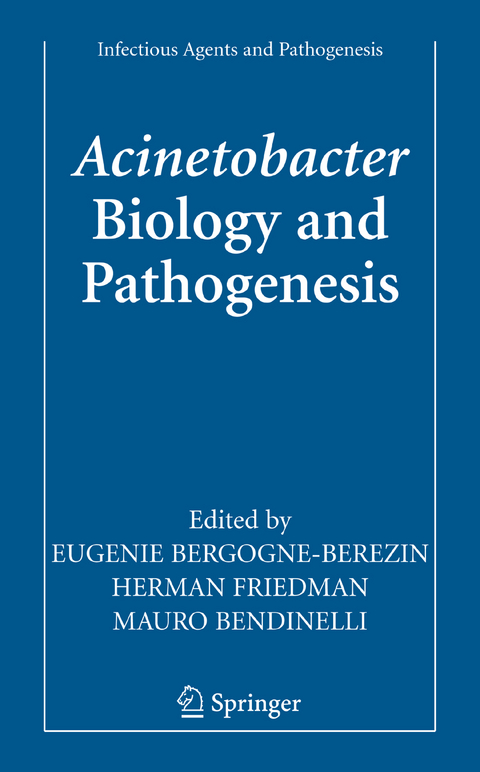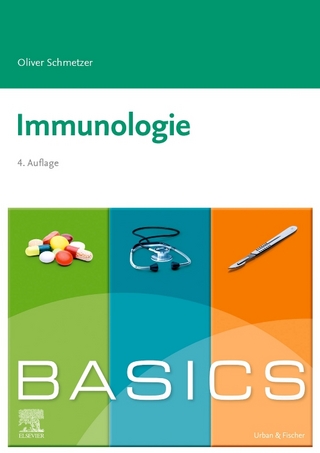
Acinetobacter
Biology and Pathogenesis
Seiten
2010
|
Softcover reprint of hardcover 1st ed. 2008
Springer-Verlag New York Inc.
978-1-4419-2672-2 (ISBN)
Springer-Verlag New York Inc.
978-1-4419-2672-2 (ISBN)
Also, it is now becoming evident that Acinetobacter infections occur frequently in violent situations such as earthquake or war zones.The mechanisms of Acinetobacter virulence are becoming increasingly clear, providing new insights into their pathogenic role in community acquired infections.
There is currently increasing interest concerning the biology and disease caused by Acinetobacter species. Such interest, however, developed relatively slowly because of the necessity to clarify the confusing taxonomy of these organisms. Much work was needed to identify various species as members of this genus, to recognize their epidemiologic profile, their pathogenic role and their increasing importance as multi-antibiotic resistant organisms. In recent years improvement of genetic approaches, recognition of plasmids, integrons and chromosomal sources of resistance mechanisms aroused interest on the role of Acinetobacters in disease by many microbiologists and clinicians, especially internists and infectious disease specialists. In this regard, physicians are frequently confronted with extremely difficult therapeutic approaches for treatment and prevention of severe nosocomial infections due to multi antibiotic resistant Acinetobacter. Moreover, recent observations of community acquired infections have been reported, especially in patients with various risk factors such as immuno-deficiencies. Also, it is now becoming evident that Acinetobacter infections occur frequently in violent situations such as earthquake or war zones.
The mechanisms of Acinetobacter virulence are becoming increasingly clear, providing new insights into their pathogenic role in community acquired infections. It is apparent the time is appropriate for detailed review of the increasing knowledge concerning important new information, both clinical and therapeutic, especially information concerning virulence, resistance mechanisms and typing of Acinetobacter spp. Many new findings are accumulating in almost an exponential manner since publication of previous books on this subject in 1991 and 1996.
There is currently increasing interest concerning the biology and disease caused by Acinetobacter species. Such interest, however, developed relatively slowly because of the necessity to clarify the confusing taxonomy of these organisms. Much work was needed to identify various species as members of this genus, to recognize their epidemiologic profile, their pathogenic role and their increasing importance as multi-antibiotic resistant organisms. In recent years improvement of genetic approaches, recognition of plasmids, integrons and chromosomal sources of resistance mechanisms aroused interest on the role of Acinetobacters in disease by many microbiologists and clinicians, especially internists and infectious disease specialists. In this regard, physicians are frequently confronted with extremely difficult therapeutic approaches for treatment and prevention of severe nosocomial infections due to multi antibiotic resistant Acinetobacter. Moreover, recent observations of community acquired infections have been reported, especially in patients with various risk factors such as immuno-deficiencies. Also, it is now becoming evident that Acinetobacter infections occur frequently in violent situations such as earthquake or war zones.
The mechanisms of Acinetobacter virulence are becoming increasingly clear, providing new insights into their pathogenic role in community acquired infections. It is apparent the time is appropriate for detailed review of the increasing knowledge concerning important new information, both clinical and therapeutic, especially information concerning virulence, resistance mechanisms and typing of Acinetobacter spp. Many new findings are accumulating in almost an exponential manner since publication of previous books on this subject in 1991 and 1996.
Importance of Acinetobacter spp..- “Overview of the Microbial Characteristics, Taxonomy, and Epidemiology of Acinetobacter”.- Genome Organization, Mutation, and Gene Expression in Acinetobacter.- Molecular Epidemiology of Acinetobacter Species.- Typing Acinetobacter Strains: Applications and Methods.- Efflux Pumps in Acinetobacter baumannii.- Acinetobacter baumannii: Mechanisms of Resistance, Multiple ß-Lactamases.- Virulence Mechanisms of Acinetobacter.- Nosocomial and Community-acquired Acinetobacter Infections.- Experimental Models of Acinetobacter Infection.- Antimicrobial Resistance and Therapeutic Alternatives.- US Army Experience with Acinetobacter in Operation Iraqi Freedom.- Perspectives.
| Erscheint lt. Verlag | 6.12.2010 |
|---|---|
| Reihe/Serie | Infectious Agents and Pathogenesis |
| Zusatzinfo | 17 Illustrations, black and white; XVI, 220 p. 17 illus. |
| Verlagsort | New York, NY |
| Sprache | englisch |
| Maße | 155 x 235 mm |
| Themenwelt | Medizin / Pharmazie ► Medizinische Fachgebiete ► Mikrobiologie / Infektologie / Reisemedizin |
| Studium ► Querschnittsbereiche ► Infektiologie / Immunologie | |
| Naturwissenschaften ► Biologie ► Mikrobiologie / Immunologie | |
| ISBN-10 | 1-4419-2672-0 / 1441926720 |
| ISBN-13 | 978-1-4419-2672-2 / 9781441926722 |
| Zustand | Neuware |
| Haben Sie eine Frage zum Produkt? |
Mehr entdecken
aus dem Bereich
aus dem Bereich
Buch | Softcover (2023)
Lehmanns Media (Verlag)
19,95 €


